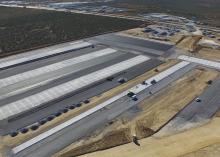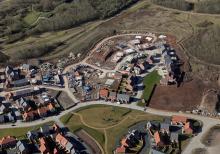The building materials giant says that powerfloating represents an evolution in the RCC pavement process, achieving an engineered solution that lays fast and features the appearance and durability of a conventional concrete surface.
CEMEX supplied over 40,000 tonnes of RCC using powerfloating for the project, a purpose-built storage area located in East England
"Powerfloating provides our customer with a pavement solution that combines the strength and durability of concrete with the ease of asphalt construction,” said Garry Gregory, director asphalt and paving solutions at CEMEX UK. “RCC alone delivers significant cost savings of up to 30% over traditional pavements, and now with powerfloat technology, RCC offers a significantly harder wearing surface that’s more aesthetically pleasing.”
The surface of powerfloated RCC is produced by spraying a specially designed admixture onto the RCC before powerfloating and curing. CEMEX says this creates a more closed, even surface than the more textured appearance of natural RCC. The smooth cement paste created during this process offers increased abrasion resistance, making it attractive for high stress areas.
CEMEX R&D, innovation, and business development projects are part of the company’s global R&D collaboration network, headed by the CEMEX Research Center in Switzerland.








